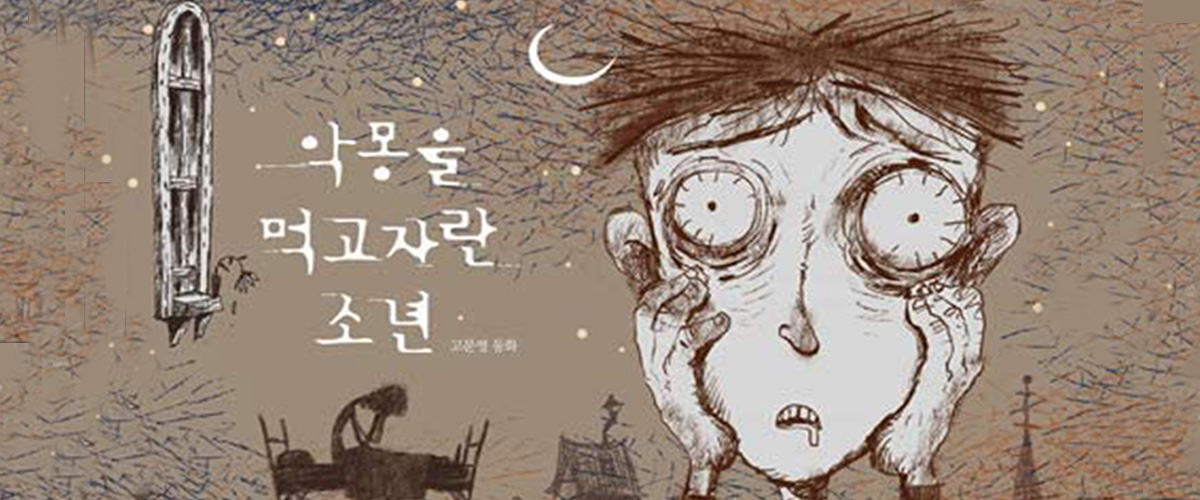Growing Our Souls Through Struggle
By Martin Thielen
May 2, 2023

The Boy Who Fed on Nightmares – by Ko Moon Young
Last year my wife and I discovered Korean dramas (called K-dramas). Our first K-drama, Navillera, tells the moving story of a seventy-year-old retired mailman who decides to pursue his lifelong dream of learning ballet. Next we watched the delightful love story, Crash Landing on You. It begins with a successful South Korean businesswoman paragliding in Seoul. A massive storm arises and blows her off course. She ends up crash-landing in the North Korean portion of the DMZ, where she is rescued by a North Korean soldier. A great adventure follows. I commend both of these series to you; you can find them on Netflix streaming.
The Boy Who Fed On Nightmares
Our most recent K-drama was It’s OK to Not Be OK. Although darker than the other two series mentioned above, it’s a profound story of wounded people ultimately finding healing through their relationships with others. The series features a brief children’s story by Ko Moon Young called The Boy Who Fed on Nightmares.
In this story, a boy struggles with bad memories, which lead to terrible nightmares. Desperate to be freed from his pain, he begs a witch to make them go away. She agrees to delete his traumatic memories and nightmares, but it will come at a high cost. Later, when he becomes a man, he will have to give her his soul. The boy agrees to the deal, and all his bad memories and resulting nightmares go away.
Years later, the witch comes back for her payment. The boy, now a man, is filled with rage because while his bad memories and resulting nightmares disappeared, he is still unhappy. When the witch takes away his soul, she says to him:
Hurtful, painful memories. Memories of deep regret. Memories of hurting others and being hurt. Memories of being abandoned. Only those with such memories burned in their hearts can become stronger, more passionate, and emotionally flexible. Only those can attain happiness. So don’t forget any of it. Remember it all and overcome it. If you don’t overcome it, you’ll always be a kid whose soul never grows.
I wish it were different. I wish we could grow and mature without pain and struggle. But that’s not the nature of human experience. Only through our struggles do we fully mature.
Paul’s “Thorn in the Flesh”
A biblical example of this truth can be found in the experience of the apostle Paul. We learn in 2 Corinthians 12 that Paul suffered from a physical aliment he called “a thorn in the flesh.” We don’t know what Paul’s ailment was. Some scholars believe he had epilepsy. Whatever his thorn was, Paul hated it and asked God to remove it from his life. He said, “Three times I pleaded with the Lord to take it away from me” (v. 8 NIV). But God did not remove Paul’s thorn.
Some problems we must learn to live with regardless of our faith. When God did not remove his physical ailment, Paul began to see it in a different light. He came to realize that good results could come from it. For example, Paul said his thorn in the flesh kept him humble. It reminded him he was an ordinary human being, small and frail, inadequate and not self-sufficient. His thorn also taught him to depend on God’s strength in hard times. In the text God tells Paul, “My grace is sufficient for you, for my power is made perfect in weakness” (v. 9 NIV). Therefore, Paul said, “I delight in weaknesses, in insults, in hardships, in persecutions, in difficulties. For when I am weak, then I am strong” (v. 10 NIV). Rather than letting his thorn in the flesh diminish his life, Paul used it as an opportunity to grow personally and spiritually.
A Bum Throat, a Hard Pastorate, and a Lost Denomination
Growing through struggle has certainly been part of my experience. For example, throughout my career I struggled with a serious and painful vocal cord disorder that constantly threatened my vocation as a minister. Along with the apostle Paul, I had a “thorn in the flesh.” But thankfully, like Paul, my physical ailment taught me important lessons including humility, empathy, setting limits on my schedule, and practicing self-care disciplines.
Difficulties in my professional life also produced growth. For example, my second pastorate out of seminary proved exceptionally challenging. The economy in my community collapsed, causing massive turmoil in every sector, including church life. Thousands of people left town in short order. Those who remained felt fearful and angry. Unfortunately, they brought all of that negative energy to church. The next three grueling years in that pastorate brought enormous pain and stress into my life. However, it also resulted in remarkable growth—professionally, personally, and spiritually. In spite of the extreme struggles, I would not delete that chapter from my life. I became a far better pastor and person for it.
One of the hardest trials of my life was the loss of my career in my old denomination. I enjoyed an incredibly good situation in that church. I pastored large and interesting congregations, including one in Honolulu, Hawaii. I also worked at denominational headquarters, taught at a seminary, led clergy workshops across the country, and published extensively with my old denomination’s publishing house. It was a great ride while it lasted.
But then it all collapsed. The leaders of my old denomination moved the church in a hard-core fundamentalist direction that I could not and would not support. Therefore, as a matter of personal and theological integrity, I left that denomination. However, making that decision proved extremely painful. For a long time I felt absolutely lost. I struggled with deep feelings of grief, anger, and bitterness. I also spent a lot of time worrying about my future and feeling sorry for myself.
“Pick the Fruit and Burn the Rest”
During that difficult time I heard an Episcopal priest named John Claypool, now deceased, tell a story about his grandfather that profoundly impacted my life. For decades a beautiful plum tree stood in the backyard of John Claypool’s grandfather’s house. The tree was the prize of the farm and the pride of John’s grandfather. Then one day a tornado swept through the community. The storm destroyed many trees, including that plum tree. The violent winds ripped the tree from its roots and left it lying lifeless on its side.
After the tornado blew over, people ventured outside to survey the damage. Before long a few neighborhood men gathered in John Claypool’s grandfather’s yard. They stood in a silent circle, gazing down at the once beautiful plum tree, now ruined beyond repair. Finally, one of the men asked John’s granddaddy, “What are you going to do with that tree?” After a long pause the old man replied, “I’m going to pick the fruit and burn the rest.”
John Claypool, who survived many trials of his own (including the death of his daughter, a divorce, and the loss of his career in the same denomination I left), went on to say that “picking the fruit and burning the rest” is the best response we can make to life’s wounds, storms, and losses. First we need to pick the fruit from the struggle, including new sensitivities, insights, and discoveries. Then we need to burn the rest, including any anger, grief, or bitterness. Finally, said Claypool, we need to move forward with our life.
That story became an inspirational epiphany for me. I knew John Claypool was right. I needed to pick the fruit, burn the rest, and then move forward with my life. So over the next several months that’s what I did.
First, I “picked the fruit.” And there was much to pick. My old denomination gave me many wonderful gifts for which I’ll always be grateful. They introduced me to Jesus, they loved and affirmed me, they became the family for me that my family of origin could not be, they educated me, and they gave me wonderful opportunities of service at a young age. I picked that fruit and will carry it until I die.
And there was even more fruit to be picked. The loss of my old career, painful as it was, resulted in significant growth for me. For example, it taught me to let go of the illusion that I am in total control of my life. It helped teach me humility. Sadly, it also revealed to me the overwhelming toxicity of religious-right fundamentalism. Most important, it taught me that my career was not my ultimate value. Instead, my relationships with God, family, and friends mattered most. In short, that trial, hard as it was, resulted in life-enriching insights.
After picking the fruit, I moved on to “burn the rest.” After many years of frustration and grief over the demise of my old denomination, I desperately needed to burn my disappointment, anger, and bitterness and let it go. It took several bonfires to burn away all the old anger and grief, but eventually I did.
Finally, it was time to “move forward with my life.” Part of moving forward was finding a more progressive denominational home. In short, that awful chapter led to significant growth in every area of my life. By picking the fruit, burning the rest, and moving forward with life, I became a far better person than I ever was before. Therefore, I would not trade that experience, painful as it was, for anything.
I tell this story not to talk about my experience but to speak to your experience. Most readers of this article are either facing a current trial, recently faced one, or will face one in the near future. It could be an illness, a divorce, a lost job, a faith struggle, the death of a loved one, or one of hundreds of other hardships. Unfortunately, ample trials exist to go around.
However painful your trial was or is, I encourage you to “pick the fruit” from it. Use your struggle as an opportunity to grow and mature and become stronger and wiser. After you pick the fruit, I encourage you to “burn the rest.” Burn the grief, anger, and disappointment, and let it go. If necessary, see a professional counselor to help you in this process. Finally, I encourage you to “move forward with your life” with courage, hope, and anticipation.
The witch in The Boy Who Fed on Nightmares was absolutely correct:
Hurtful, painful memories. Memories of deep regret. Memories of hurting others and being hurt. Memories of being abandoned. Only those with such memories burned in their hearts can become stronger, more passionate, and emotionally flexible. Only those can attain happiness. So don’t forget any of it. Remember it all and overcome it. If you don’t overcome it, you’ll always be a kid whose soul never grows.
Don’t be a kid whose soul never grows. Instead, embrace your pain and use it for growth. In the words of John Claypool’s grandfather, “Pick the fruit and burn the rest.” It’s the best gift you’ll ever give yourself.
AUTHOR’S NOTE
To share this post, please click the appropriate icon at the bottom of the page. If you would like to communicate with me, feel free to send an email and I’ll respond as soon as possible. To receive my monthly newsletter (a brief email notification alerting you to new posts and other materials), please do so today. Thank you for your interest in Doubter’s Parish. Writing for you is a joy.
